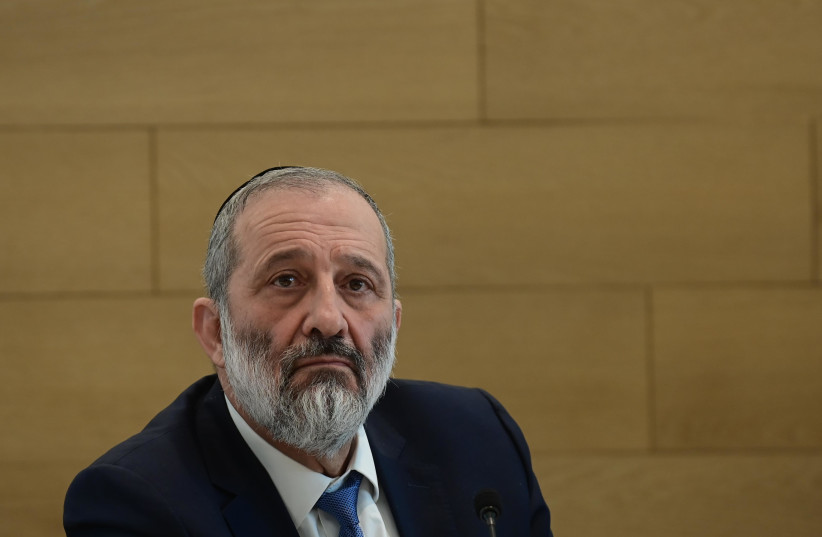Reactions to the High Court of Justice’s ruling against Shas Chairman Arye Deri’s ministerial appointment showed that both the right and left see the decision as deeply connected to the judicial reforms proposed by Justice Minister Yariv Levin — reviving the question of how much the reforms impacted the court decision.
Deputy Transportation Minister Uri Maklev (United Torah Judaism) declared following the ruling that it would “become the driving trigger for fundamental legislative changes to create the required balances in the legal system.”
The left-wing NGO the Black Flag movement welcomed the court’s decision but encouraged protest against the judicial reform as a continuation of the outcome.
The connections between the Deri case and the reform were not only made after the ruling but also prior to the hearing on the case — and there were even accusations made by major legal authorities that the reform was announced in a manner intended to influence the decision.
Levin made his announcement on January 4, the eve before the Deri hearing on January 5.

Which judicial reform challenges were being petitioned on in Arye Deri's case?
Several of the items challenged legal tools that were being petitioned on in the Deri case.
Levin attacked the Reasonableness Clause, which allows for the court to interfere in in administrative issues which are beyond the scope of what is reasonable for a responsible authority. He rejected the existence of the clause altogether. Petitioners argued that it was unreasonable for Deri, who has a criminal sentence, to be minister.
The proposed reform also called to restrict the ability for the court to engage in judicial review, the ability to strike down Knesset legislation that contradicted Israel’s quasi-constitutional Basic Laws. The reform would have them only able to perform a review with a special majority.
Petitioners against Deri argued that the amendment to the Basic Law: The Government — that allowed Deri to serve as a minister despite his criminal past — was procedurally flawed, and called for the court to intervene.
The potential introduction of an override clause, which would allow the Knesset to cancel the court’s striking of laws with a simple majority of 61, was seen by many as a threat to the court, even specifically on the Deri issue.
Critics compared the announcement just before the hearing to a loaded gun to the head of the court.
This included former High Court president Aharon Barak, who told N12 on January 7 that the act was a “scandal.”
With the loaded gun of the override clause pointed at the court, it must be asked if the justices sweat, and ruled in a fashion that they wouldn’t otherwise.
The High Court ruled that Deri could not be appointed to a ministerial role on the grounds of the Reasonableness Clause, that his long history of criminal actions while in public service made his rising to a post of political unreasonable.
However, the court refrained from ruling on the matter of the Basic Laws and whether the Knesset abused its constitutive authority.
Some of the justices explained in their ruling that the intervention of the court in the Basic Laws should be a rarely used tool for extreme cases, otherwise it would undermine the power’s legitimacy.
Yet with the proposed reforms, that very power’s legitimacy is being questioned, raising the specter of interference.
The sense from the ruling was that the realm of judicial review need not be broached if the petition was already answered through the Reasonableness clause.
The limited discussion in the ruling on the abuse of constitutive authority entertained the arguments of the petitioners. Critics of the Deri Law amendment argued that the legislation was hastily passed, was a personal law, and changed the rules of the game of the election as it was being played.
The court acknowledged that the amendment was “stained” with a personal nature rather than being a general law, though justices argued that motive was not enough on its own to be considered abuse.
The court also acknowledged that the amendment was hastily passed, but said that the Knesset when through all the needed processes.
The court said that the individual elements did not meet the requirement to demand judicial review, but it would be difficult for outside observers to know that was truly the reason or the court hoped to soften the backlash and save judicial review at the expense of the Reasonableness clause — which has already been singled out as a target for the right following the ruling.
It is true that the court very rarely engages in such judicial intervention, and this makes it more likely that the reforms didn’t impact the ruling.
However, because of the closed nature of High Court deliberations, it would be difficult to be certain.
The lack of certainty could inspire politicians to propose further legislation impacting politically charged cases on the eve of their hearings.
The unforeseen impact of the reform on the Deri hearing is that it could set a precedent, not a legal one, but a social norm for the government to threaten the court with laws to reduce the courts power. And perhaps the next reform could alter a ruling.
